- Rules/Help/FAQ Help/FAQ
- Members Current visitors
- Interface Language
Follow along with the video below to see how to install our site as a web app on your home screen.
Note: This feature may not be available in some browsers.
- English Only

Business trip vs business travel
- Thread starter Blackbarry
- Start date Jul 21, 2016
- Jul 21, 2016
Good evening everybody, that's my today's big doubt, hope someone helps me... I know that the correct expression is business trip , but here and there I have also found business travel : - is the second phrase correct? - if not, why? - if yes, what's the difference between the two expressions? Thanks in advance!
london calling
Senior member.
Can you tell us where you found 'business travel' and quote the complete sentence?
Jason_2_toi
The latter, business travel, is a general term, while trip is of course a particular journey.
I have found "business travel" in several web sites (also Wikipedia) and in the research material on Business English I am collecting; the complete sentence I'm referring to is "I am going on a business travel next month": it is included in an exercise. I suppose that's a wrong answer, isn't it? ... Thank you very much for your help, both of us. Bye!
- Dec 5, 2017
- Dec 8, 2017
micaaixa said: Hello, everyone! My english teacher told me that the main difference between business trip and business travel is the following: BUSINESS TRAVEL: the kind of activity a company deals with BUSINESS TRIP: the action or activity you do as a person In general, business trip is more common but business travel also exists. Click to expand...
JulianStuart
I agree with Jason. Below is an example: I spend four months of the year out of town on business travel. Next week I will take a business trip to Boston. I will be gone for two weeks.
- Jul 13, 2019
A business trip is one specific journey for business purposes whereas business travel refers to traveling in general for business purposes.

Nice to meet you.
Enter your email to receive our weekly G2 Tea newsletter with the hottest marketing news, trends, and expert opinions.
Business Travel: The Beginner’s Guide
June 12, 2019
by Rob Browne
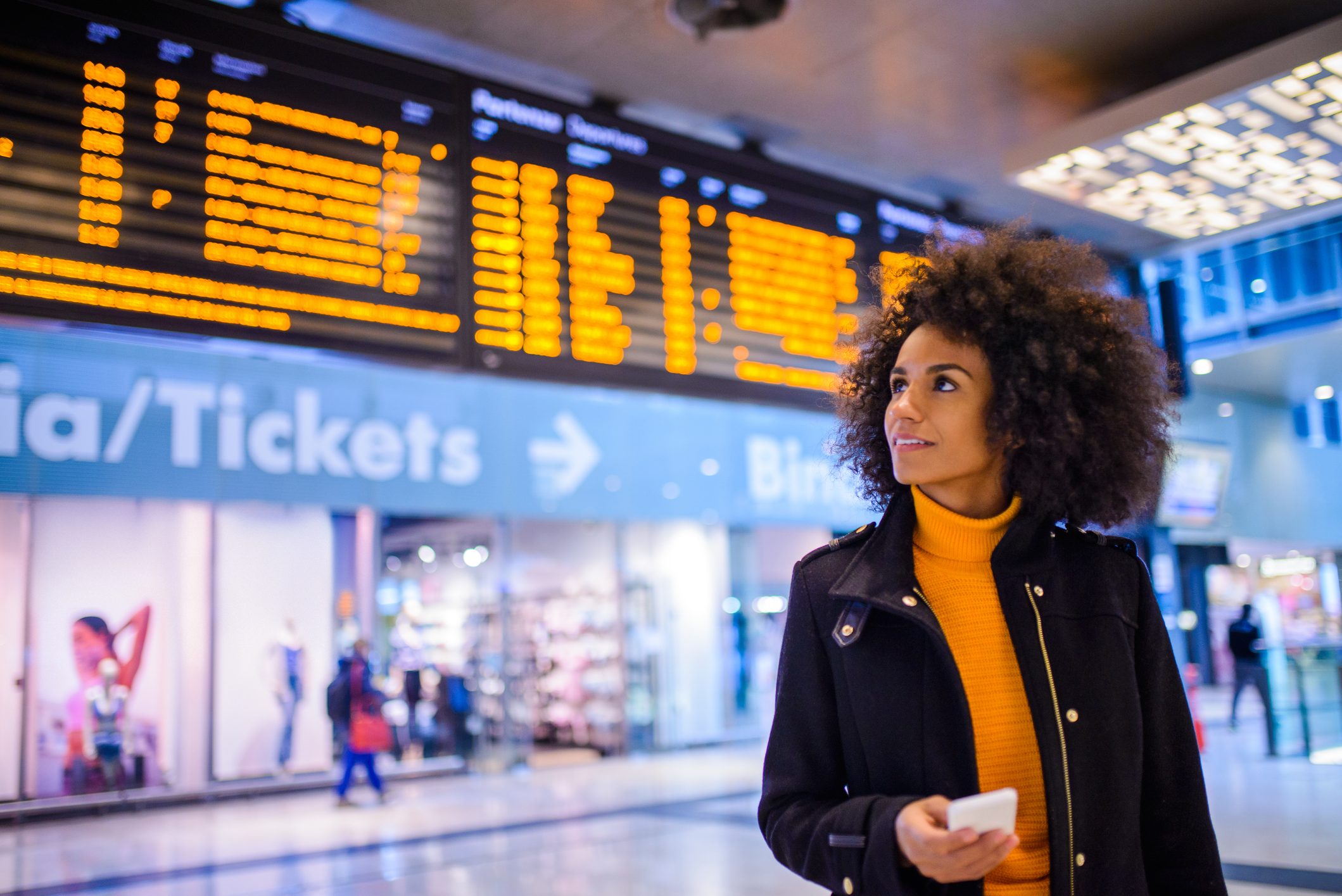
In a world where it has become as easy as a quick few taps on smartphone to book a trip across the world, business travel is more widespread and accessible than ever before.
Are you a recent graduate or new employee looking for an introduction to business travel? This article provides an overview of the field as a whole as well as a guide to traveling for work and managing your business travel expenses .
What is business travel? A step-by-step business trip guide
Research from Statista shows that business travel contributes almost $1.3 trillion to the global economy in a single year, making it one of the world’s largest economic industries. Further research highlights only upward trends in the amount that is spent on business travel as well.
This research reflects an increasingly intertwined global economy. With the speed at which businesses on opposite sides of the world can interact over the internet and travel to meet with each other, employees are operating in a space where location is fluid and business interests can converge across state, national, and continental lines.
Thus, business travel is a vital part of many companies’ lifebloods. In this article, we’ll explore the four temporal components of a business trip and use them as a lens through which to discuss business travel.
Booking business travel
Oftentimes, the dates and general logistics of your business trip are determined by the wants and needs of the client(s) you visit on the trip. If possible, it’s always best to book as far in advance as you can to plan on being out of office. Of course this won’t always be the case, as business trips occasionally arise on short notice if a client needs a quick turnaround time on a particular task that requires a visit.
Booking a business trip is not the same as browsing the internet for the best deals on a family vacation . The online booking platform (OBT) that you use for securing your transportation and hotel depends on your company’s internal travel policy.
Some companies require their employees to book through a specific brand of travel management software or using a travel management company . A key motivator for companies to use travel management software is that it makes it easier to ensure that employees comply with corporate travel policies. These policies include which airfare class employees are allowed to book, which hotel star class they can stay in, and the class of rental car they can use.
For others, booking your business trip may be a similar experience to booking a trip outside of work, as some companies tolerate open market bookings.
The rigidity with which you’ll be dealing with in terms of booking compliance is dependent upon your company’s travel policy and budget. In most cases, you’ll be looking at a range of mid-tier flight and hotel options that best fit your needs in terms of schedule and distance from the site where you’ll conduct most of your business.
Preparing for the trip
Business trips are often short and have a singular purpose. Get to your destination, meet with the people you need to meet with, and go home. Because of the high energy level required for such a focused itinerary, you’ll want to make sure that you are well-rested going into the trip.
After arriving at your destination, there may not be time to catch a nap before heading to your first meeting, so you’ll want to ensure that you are able to operate at peak performance as soon as you arrive.
Travel with your important items in your carry-on bag just in case anything happens to your checked luggage. Almost everything you bring on a business trip should be essential to your work, and with a short turnaround between arrival and meetings, you can’t risk not having item X, Y, Z..
On the trip
While on your trip, optimize for everything you can. Outside of any business-related commitments, you’ll want to make sure you have as much time as you need for your work. If there is a particular company policy regarding a daily per diem, or allowance, for meals or transportation, you’ll also need to keep that in mind.
If your trip is to a destination with a lot to see outside business hours or a place where you have friends or family, you can also check with your company’s travel policy regarding bleisure travel. Bleisure, a combination of “business” and “leisure,” means adding a few days onto the beginning or end of your trip to enjoy the opportunity to spend some time not only inside an office.
After the trip
The most important part of finishing a business trip is gathering your expenses and filing an expense report. Between flights, hotels, other transportation, and food, you likely spend a decent amount of money and would like your expenses to be approved and reimbursed as quickly as possible.
Having your expenses approved and reimbursed is typically an easy process, especially if your company uses a form of expense management software .

It’s a trip!
Traveling for work may seem daunting, but thinking about your trip in terms of these four segments will help you succeed at all points of your trip. If your job allows you the opportunity to spend time outside of your office, enjoy it—and maybe spend time in some exciting destinations along the way.

Rob is a former content associate at G2. Originally from New Jersey, he previously worked at an NYC-based business travel startup. (he/him/his)

Alright. You started your small business and everything seems to be going pretty well.

Contributor Network
Imagine a world without communication: business would grind to a halt, governments would be...

If you own a small business, you know how difficult it is to get everything up and running...

Never miss a post.
Subscribe to keep your fingers on the tech pulse.
By submitting this form, you are agreeing to receive marketing communications from G2.
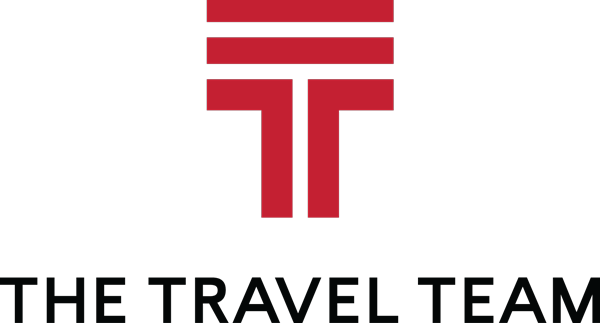
- Meetings & Incentives
- Reservation Support Tools
- Core Values
- TRAVEL JOURNAL
- Exclusive Offers
- Talk to an Agent
- Contact An Expert: 1-800-245-8326
- Traveler Login
The Travel Team. All rights reserved.
6 Types of Business Travel
While Zoom and other online technologies are easily accessible and make great tools for virtual communication, business travel is still pivotal. Companies that realize the important purpose of business travel reap the many benefits that it brings. According to Oxford Economics , the sales return on each dollar invested in business travel was between $10 and $14.99. Each of these types of business travel offers its own benefits and can be made even more cost-effective with managed travel .
Why travel for business?
There are plenty of reasons for business travel, but putting a face to a name is chief among them. Simply put, nothing closes a deal, develops a relationship, or cements a partnership like a handshake. The benefits to face to face interaction extend to all types of business travel and help to meet a variety of business objectives.
1. Exhibitions and Trade Shows
A great way to promote your product and expose it to new people, whether it’s food or a college education, is to attend an exhibition or trade fair in a different region, or maybe even a foreign country. You’ll also be able to look at your competitors’ products and services, as well as network with those in your industry.
Exhibitions can be big-budget events where innovative companies unveil cutting-edge products. The primary benefit of business travel–conducting business face-to-face–extends to exhibitions and trade shows where a person can ask questions and vendor relationships can be established. Moreover, the small investment of sending a handful of employees to trade shows can pay big dividends, especially in industries where it’s important to identify trends early, like in tech, healthcare, or finance.
2. Conferences and Meetings
If a meeting or conference related to your business or industry could be worthwhile for growth or networking opportunities, think about going the distance.
As travel ramps up to its pre-pandemic levels, the annual industry conference or company meeting will resume for many. For businesses with multiple branches or regional offices, an annual meeting might be the only opportunity for a company’s employees to meet in person. For remote employees that only interact with colleagues and supervisors virtually, a centrally-located annual meeting is a perfect opportunity to inspire a deeper connection among coworkers.
3. Corporate Events
Corporate events take many different forms and functions, including meet and greets, business to business meetings, and employee-only gatherings. Corporate events often present networking and marketing opportunities, as well as the chance to meet peers face-to-face while engaging in instructional training.
4. Incentive Travel
Incentive travel is funded by an employer to motivate employees, usually to achieve a goal. A corporate-sponsored trip to an enticing destination not only offers a fantastic reward but also inspires company loyalty. In turn, the employee is given encouragement, a break from workplace stress, and an awesome reward!
ROI for travel programs can grow over time as you develop relationships with hotels and other vendors. You can also expect to spend less on employee recruitment and turnover as travel programs help retain your highest-performing employees. Plus, planning an incentive travel program is easier than you think .
5. Team Building Activities
For team building activities to provide maximum benefits, they need to be exciting and engaging. Employees simply aren’t going to make the extra effort to connect in a way that is valuable to your business unless you go the extra mile. Make team building a truly exciting event by adding travel to the equation.
Popular team-building destinations are more affordable than you might guess—especially when taking advantage of the group rates being a business customer can grant you.
The cities of Las Vegas , San Diego and Nashville have all become epicenters for corporate team-building getaways. Travel advisors can plan a team-building trip with long-lasting benefits by linking your company with high-impact team-building and off-hours activities sure to please just about any employee.
6. Bleisure Travel
Bleisure travel, a growing trend, is time added to a business trip for leisure. It’s the perfect opportunity for business travelers to stick around in a new location and explore what it has to offer without all of the travel costs of a vacation.
Business leaders may wonder why bleisure travel is included on a list of types of business travel. The truth is, businesses have a role to play–and benefits to enjoy–when it comes to their employee’s pursuit of personal travel. By coordinating with an employer to add extra days to a business trip, either by taking time off or working remotely, employees are likely to be more focused during the business portion of their trip. Without having to cram in sightseeing after a long work day or over their lunch hour, they can focus on the task at hand!
Want to Learn More?
Contact our dedicated corporate travel experts by filling out the form below or calling 1-877-357-4471.

© 2024 The Travel Team | Privacy Center
When you visit any web site, it may store or retrieve information on your browser, mostly in the form of cookies. Control your personal Cookie Services here.
- wordpress_test_cookie
- wordpress_logged_in_
- wordpress_sec

What is business travel? Definition and examples
If you fly somewhere on behalf of your company, you are one of the millions of people involved in Business Travel each year worldwide. The term business travel refers to traveling for work purposes. We call each journey a business trip . If you drive across town to visit a client, that is not business travel. Business travel is longer.
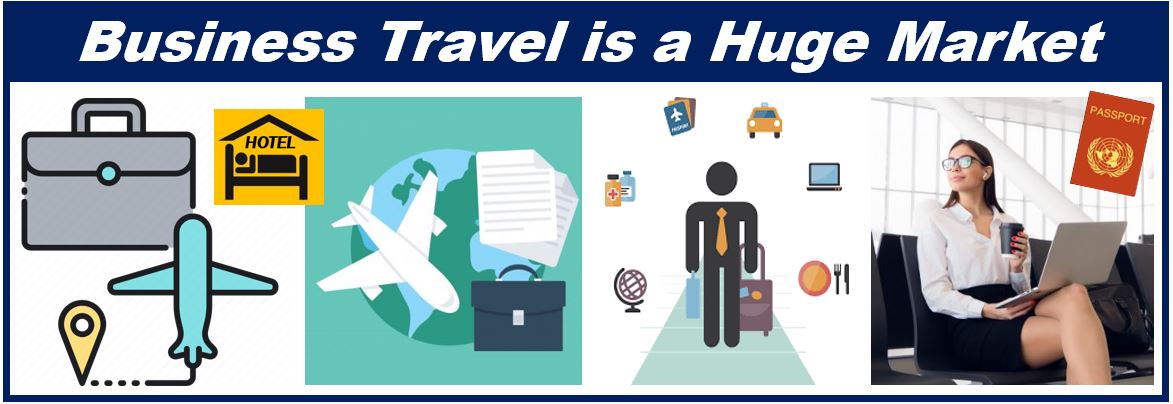
If I say: “John is on a business trip,” we imagine he will be away for more than one day.
Wikipedia.org has the following definition of the term :
“Business travel is travel undertaken for work or business purposes, as opposed to other types of travel, such as for leisure purposes or regularly commuting between one’s home and workplace.”
Why go on a business trip?
There are literally dozens of reasons for business travel. Even if your employer is not a commercial entity, your trips may still be classed as business ones.
What about military personnel who specialize in purchasing defense equipment, missiles, vehicles, and airplanes who are flying to a military air show? Is this an example of business travel? Yes, it is.
So, rather than saying that business travel relates to journeys that are business related, we should say that they are work related.
Below is a list of types of trips people can make for work purposes:
- Attending a conference, convention, or trade show.
- Considering, examining, inspecting, or assessing new markets.
- Evaluating a project site.
- Going for a job interview far away (especially if your are an executive or specialized professional).
- Installing equipment for a customer.
- Meeting with colleagues (from the same company) at a faraway location.
- Motivating your staff to boost employee loyalty.
- Negotiating with suppliers.
- Networking.
- Promoting a product or service.
- Seeing a demonstration of something you may buy.
- Visiting customers.
- Meeting prospects (contacts who could turn into a customers).
- Apologizing to somebody.
Business travel and COVID-19
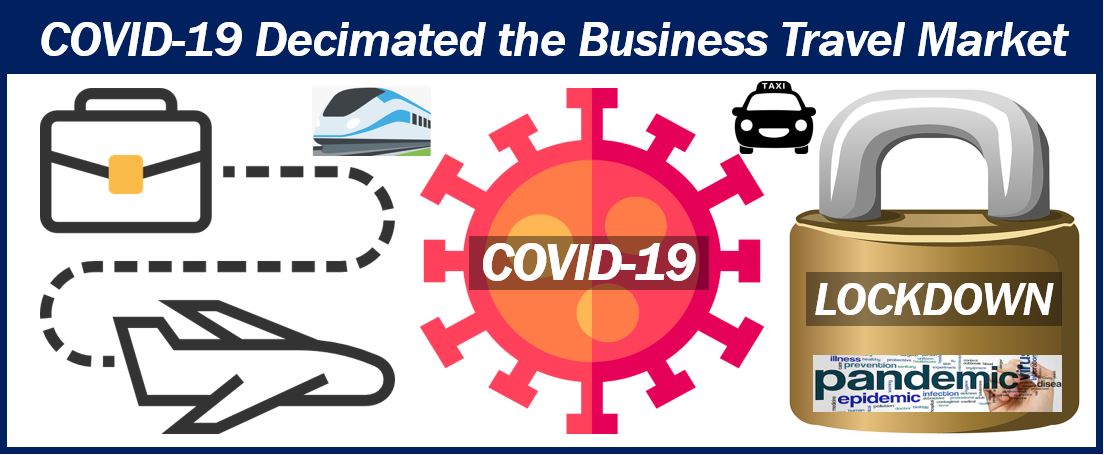
The market for business travel globally is huge. The World Health Organization says that approximately thirty percent of international trips are business-related. Until the coronavirus (COVID) pandemic hit at the beginning of 2020, the market had been forecast to expand rapidly over the next decade.
However, COVID-19 changed all that. The year 2020 saw a dramatic decline in all types of travel, including by air, ship, and land. Business traveler numbers are no exception. As businesses embrace modern telecommunication tools to communicate with employees, clients, suppliers, and other stakeholders, a new trend has evolved – the trend of replacing business travel with online meetings and events.
In August 2020, in the middle of the coronavirus pandemic, Alexander Joe wrote the following in an article we published :
“Business travel has been hit hard during the pandemic. Before you make travel arrangements, make sure that you are permitted to enter your country of destination by checking the latest government guidelines. If possible, it is wise to avoid travel, and if possible, to conduct meetings with colleagues and clients digitally for the time being.”
A permanent trend?
Many conference organizers and airline executives wonder whether this new online trend will prevail after the pandemic is over. Companies have not only found that modern technology is suitable for their needs, but also that communicating online with faraway people is considerably cheaper than face-to-face.
Anything that saves money and helps boost the bottom line is an attractive prospect for CEOs and board members. Bottom line , in this context , means net profit, net earnings, net income, or net EPS (earnings per share).
In a BBC article, Natasha Frost wrote :
“Since the Covid-19 pandemic hit, business travel has ground to a halt. We’ve moved critical client meetings to Zoom, allowed our frequent-flier cards to gather dust and learned how to communicate with colleagues around the world without jumping on a plane.”
“But is this the start of a new normal for business travel?”
Pros and cons of business travel
Traveling is great for broadening the mind and learning new things. However, if somebody has a family, there is definitely a price to pay. Missing family events may contribute to relationship difficulties.
It is also difficult if you don’t have any children but have a partner at home that you like to be with as much as possible.
Many people who travel frequently on business say that they feel lonely while away. Healthcare professionals, for example, have commented that several of their patients who regularly go on business trips show signs of declining mental health, and in some cases, depression.

Jet lag or jet lag disorder is common for people who travel across time zones. Jet lag is primarily a temporary sleep disorder which can make you feel unwell and cause daytime fatigue. Sufferers often find it hard to stay alert and may also have gastrointestinal problems.
If you suffer from jet lag, you have a greater risk of being involved in a road accident. Try to get somebody else to drive if you feel drowsy when you get back from your trip.
If your business travel is successful, i.e., good for your employer, your opportunities for promotion may improve. If you visit branches of your company, you will make new face-to-face contacts. In fact, one of them may offer you an interesting position in the future. Without your trips, this opportunity may never arise.
On a personal note, if you like learning about different cultures and how people abroad go about their lives, business travel is great. Not only do you learn a lot, but you also do it on the company’s expense.
If you accumulate lots of airmiles or reward points, you can use them for big discounts when you take your family on vacation. You may get special concessions from airlines, airports (VIP lounges), hotel chains, restaurants, currency exchange agencies, and car rental companies.
With the advancement of smart technology, business travel is becoming more efficient as travelers can check in, navigate airports, and manage itineraries using their smartphones.

Terms related to business travel
There are many words and expressions in the English language that are related to business travel. Let’s look at six compound phrases that contain the words “business travel,” understand their meanings, and see how they are used in a sentence:
Business travel expenses
The costs incurred while traveling for work purposes. Example: “The finance department requires all receipts to accurately reimburse business travel expenses.”
Business travel policy
A set of guidelines a company establishes for employees to follow when traveling on business. Example: “Before booking your flight, please review the business travel policy for approved airlines and accommodation.”
Business travel insurance
Insurance coverage designed to protect travelers from risks associated with traveling for work. Example: “Given the unpredictability of international trips, our company always recommends purchasing business travel insurance.”
Business travel management
The process or practice of managing and organizing corporate travel. Example: “Our agency specializes in business travel management, ensuring clients have a seamless experience.”
Business travel consultant
A professional who advises on and arranges all aspects of travel for businesses and their employees. Example: “To optimize our travel budget, we hired a business travel consultant.”
Business travel planner
A tool or service used to organize the details of travel for work. Example: “The business travel planner app was instrumental in coordinating the complex itinerary for our sales team’s roadshow.”
Video – What is Business Travel?
This video, from our YouTube partner channel – Marketing Business Network – explains what ‘Business Travel’ is using simple and easy-to-understand language and examples.
Share this:
- Renewable Energy
- Artificial Intelligence
- 3D Printing
- Financial Glossary
Small Business Trends
15 business travel tips.

If you buy something through our links, we may earn money from our affiliate partners. Learn more .
Business travel can be fun and exciting, but there are many things you can do to make the experience better for a successful business trip . Whether you’re going for international business travel or domestic business travel, there are lots of things you can do to optimize business travel, including business travel safety. Here are some of the key business travel tips to keep in mind for your next trip.
How to Use These Tips for Business Travel
These tips will likely be most beneficial for a first-time business traveler, but even seasoned business travel professionals will find them valuable as reminders. These great tips can be incorporated into your business travel plans before you leave for your destination, as well as for when you get there.
Best Travel Tips for Your Next Business Trip
We’ve put together some essential business travel tips to help make business trips easier and help you gain more from each trip in this article, with additional travel safety tips for women available as well. This is by no means an exhaustive list, so feel free to share more business travel tips in the comments, as it will help others!

1. Look for coworking spaces on your next business trip
While staying in your hotel room might be tempting the whole trip, why not break the monotony a little? A coworking space is a great way to meet people on your corporate travels, and it makes it easier to work. You can take a business meeting there or rent a desk to get some work done and stay connected without being cooped up in a hotel room all day. As an alternative, you can also go to a local coffee shop to work out of as well if a coworking space doesn’t work.
2. Collect air miles
If you’re flying out for trips, you should sign up for air miles with any airline used for corporate travel and/or your preferred airline. Miles add up when you travel with the same airline, and you can use the perks like a cheaper flight, rewards, and advantages to your benefit for personal and professional travel moving forward.
3. Join a hotel rewards program
Asides from an air miles program, if you’re a frequent business traveler, you should also be part of a hotel rewards program. Like air miles, hotel rewards programs will give you a lot of perks and benefits as you accumulate points for hotel rooms booked through business travel. That can prove to be useful both personally and professionally, so make sure all your points get logged.

4. Seek out airport lounge access
Long layovers, flight delays, a long flight, or a combination of it all can often mean that you’re stuck in airports for a long time and generally feel pretty exhausted. Airport lounges are definitely something to consider since they offer a lot of benefits, including airport snacks, food, showers, a place to rest away from the crowds, and more. You can get access to airport lounges in a few different ways: If you’ve booked first-class or business class, most airlines usually have their airline lounges. You can also gain access through airline miles, a travel credit card, and more, so make sure to research beforehand.
Read More: international business travel
5. Maintain healthy habits
Even when traveling for work frequently, it’s crucial to take care of yourself and establish some kind of work-life balance. Jet lag and adjusting to local time are often issues during international business travel. However, it’s easy to let habits slip during the trip, even with domestic travel. Opt for healthy snacks where possible and use the hotel gym where you can to maintain cardiovascular health and take a break from work. You could also plan ahead and pack a bathing suit so you can use the hotel pool if the gym seems less appealing, but the goal is to make sure your physical health stays a priority even when traveling across a different time zone.
6. Look for rental car deals
If you need to drive a lot during your business travels, you should always keep an eye out for rental car deals. Many hotels and nonstop flights with certain airlines have package deals with rental cars that can save money and make it more efficient. You could also have it set up so that you’re able to pick up the rental car from the airport and drive straight to your hotel, rather than having to search for a taxi for added ease.

7. Pack Light
The best packing tips for business travelers tend to start with the same one: Pack light. Packing light makes it easy to move through airports and means less time spent trying to stuff everything into your suitcase last minute. If you want the essentials packed easily like travel toiletries, travel kit, casual clothes, and business clothes but don’t have space, there are options. For example, you can invest in items like packing cubes to help you stay organized while packing more. If you’re packing a suit, you can also get a suit bag for your suit jacket to avoid wrinkles.
8. Find your perfect carry on
Carry-on bags are essential travel bags that provide a lot of benefits for travelers. They’re usually pretty room, and having carry-on luggage means that you can take your bag with you on the plane. In addition, it speeds up travel quite a bit since you’re not waiting at baggage claim. A carry-on is usually on the smaller side for a business traveler and should fit in the plane’s overhead storage. Different airlines have dimensions requirements, so make sure to check the airline’s policy before purchasing – especially if traveling abroad.
9. Consider purchasing travel insurance
Travel insurance can be useful for business travel since it provides protection for different scenarios. Depending on where you’re traveling to and other factors, it might be worth researching insurance options for your business travel needs for emergencies.
10. Check-in for your flight online
Checking in and getting your boarding pass tends to be one of the more time-consuming parts of travel, but luckily, airlines have come up with ways to make it easier. For example, you can now check-in online for flights and add your boarding pass to your phone. That way, you can go straight to the gate when you’re at the airport and board, rather than having to wait in line to check-in and receive a physical pass.

11. Invest in noise-canceling headphones
Good headphones are important for business travelers and can be incredibly useful for both long and short business trips. A nice, high-quality pair of headphones that cancel noise can make noisy flights more relaxing, watch movies and TV while traveling, and even help you catch some shut-eye. Depending on your preferences, you can get over-ear headphones or noise-canceling earbuds .
Read More: Business Travel Safety Tips
12. Do your expense reports frequently
Expense reporting is not always the most fun task, but it is crucial. One of the most popular business travel tips tends to be around keeping an eye on expenses while you travel. Instead of trying to store all your receipts and backtrack filling out reports, try to do it on the go. You can take photos of receipts and log expenses in chunks throughout the trip to make the process easier.
13. Purchase a strong laptop bag
For your next business trip, it’s definitely worth investing in a bag for your laptop. It’s useful both for traveling internationally and on domestic trips and protects your work laptop from any nasty falls or damage. Some great bag options are available for laptops, including a sleek compact laptop bag or a messenger-style bag .
14. Optimize the airport process
If you’re planning on flying a lot, finding ways to cut time can make traveling so much easier. For example, checking in online is one method, but frequent travelers also have other ways to go through the airport process faster. Business travelers can sign up for Global Entry and TSA pre-check programs that provide immense benefits to frequent travelers. These programs are designed by the government to help you move through security lines faster and cut out time spent waiting in queues. You can sign up for these programs online, and they are essentially ways to expedite the security process at airports.
15. Frequent business travelers can still explore
A common misconception is that you don’t get to explore during business travel, but usually there are ways to get out and see at least some parts of the city. Look up some local visitor guides and travel blogs beforehand to understand what’s near your hotel, and what’s feasible for you to see. For example, you could try a popular local restaurant during your lunch break, or have an early dinner and catch a few shows during the week after work. If you have to undertake international travel or domestic travel for a corporate event, try and see if you can extend your stay for a few days before or after the event and take some time off to check out the city and sites.
Business travel presents both challenges and opportunities, and by following these valuable tips, you can enhance your overall experience and productivity during your trips. These tips cater to a wide range of aspects, from travel logistics to personal well-being, ensuring that your business travels are as efficient and enjoyable as possible.
Remember to maintain a healthy work-life balance, take care of your physical and mental well-being, and seize the chance to explore new places when the opportunity arises. By adopting a proactive approach to business travel and staying organized, you can navigate the demands of corporate travel with ease and make the most of each trip. Whether you’re a seasoned business traveler or embarking on your first corporate journey, these tips will help you optimize your travel experience and achieve success on the road. Safe travels!
Read More: travel safety tips for women
Save money on shipping costs for your Amazon purchases. Plus, enjoy thousands of titles from Amazons video library with an Amazon Prime membership. Learn more and sign up for a free trial today.
Image: Depositphotos

© Copyright 2003 - 2024, Small Business Trends LLC. All rights reserved. "Small Business Trends" is a registered trademark.

Service unavailable in your location
Unfortunately Booking.com for Business is currently not offering its services in your location

Select your preferred language
- Deutsch English English (Australia) English (China) English (India)
- English (United Kingdom) Español (Latinoamérica) Español (España) Français Italiano
- Português (Brasil) Suomi Svenska 中文
Top tips on how to plan a business trip
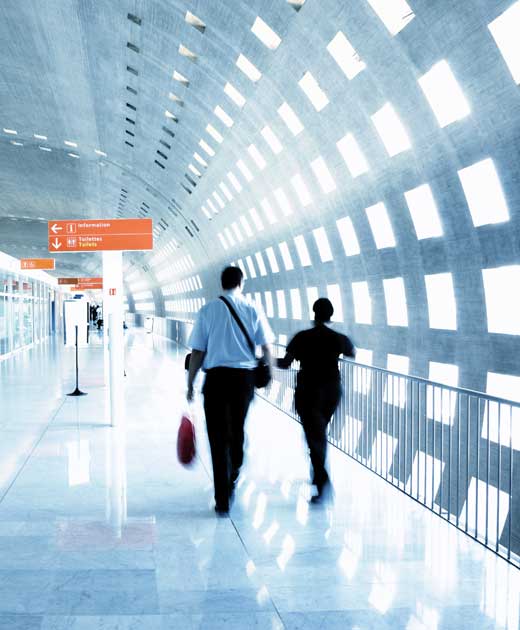
Follow these 6 steps for an effective business trip:
- Make your travel arrangements well in advance
- Select your accommodation based on both price and convenience
- Create an itinerary
Research your destination
- Remember your electronics, accessories and travel documents
- Prepare for your meeting
In today’s digital world, we can communicate across different time zones at a moment’s notice. However, when it comes to brokering a big deal or fostering a solid and long-lasting business relationship, nothing beats face-to-face interaction.
Corporate travel is still so important, and it’s equally important for anyone making a business trip to prepare thoroughly. When you arrive at your destination relaxed and well-prepared, you’re better equipped to make a good impression and focus on the purpose of your meeting. Preparation lets your mind focus on the here and now, making sure you stay on the ball in that all-important meeting. If you’d like to fine-tune how you get ready for your next excursion, follow these essential tips to become an effective business trip planner.
Make travel arrangements
Whether it’s your name on the travel documents or you’re a travel manager, planning business travel thoroughly is important. Your first step should always be to familiarize yourself with your company’s corporate travel policy . You’re making travel arrangements for a business trip, not planning a personal or a short break, so being compliant with your company policy is essential.
Next, it’s time to book your travel. This may involve traveling by air, rail, car hire or even boat. Think about the journey door-to-door, balancing travel times against cost and convenience. Visualize the various steps of the trip from A to B. Consider details like how long it will take to move between airport and railway station, the time it takes to fill out paperwork at the vehicle hire company, and whether luggage storage might be useful. Use multiple sources and different comparison sites, researching which companies are offering the best deals. Again, be aware of any budget restraints in your company’s travel policy.
Don’t forget the small details. Does the airplane have Wi-Fi so you can work on the move? Would leaving a day earlier allow you to arrive at your first meeting better rested and prepared? At this stage, the more carefully you prepare, the more confident and relaxed you’ll be when you depart.
Select your accommodation
Preparing business travel is, of course, only half the job. Choosing the best accommodation for your requirements is also essential. If you’ve only got one meeting place to reach, make sure you book a hotel that’s nearby – rather than be swayed by a more luxurious option that might be a stressful 45 minute trip away. Use maps on your smartphone to measure distances from the station or airport to your hotel – and remember the roads and transport networks will be busier at certain times of day.
Check your company’s hotel policies to see if there are any preferred hotels - you might be able to get a good deal too. When considering the cost, make sure you compare rates for similar types of accommodation and make sure you select something that’s fairly priced – some companies even stipulate a cost per day that would limit the choice of hotels.
It’s also a good idea to pay close attention to the amenities at the hotel. Some tourist-focused hotels may serve breakfast too late for your early starts, and as a business traveler you’re likely to want free Wi-Fi, 24-hour room service, plenty of power points for charging your devices. CWT Hotel Intel gives travelers access to trusted peer hotel reviews and can be a handy tool for business trip planners.
Create a detailed itinerary
Your itinerary is your blueprint for a successful business trip. Use it to stay in control of every detail – from transport times and the names of those you’re meeting, to your travel reservations and hotel address. Be sure to allow yourself extra time on your itinerary for relaxing, meetings that have been delayed or overrun, and busy traffic. Consider using a specially designed tool like the myCWT app , which syncs your itinerary with work calendars, and allows travelers to share this with colleagues. This is handy from a communication and efficiency perspective, and as a safety measure if you’re travelling to an unfamiliar destination.
It may be that you’re traveling to a destination you are familiar with and feel comfortable in. Or, you may be entering unchartered territory. If that’s the case, research is essential to avoid unnecessary risk. For example, some cities are well known for pick pockets, so you’ll need to be extra careful when storing important and expensive items like phones in your pockets. Depending on where you’re going, reading up on the current political situation at your destination could also be prudent.
Perhaps you’re traveling to a city or country with a different culture and customs to your own. Avoid looking foolish or, worse, causing offence, by researching the differences in behavior and manners before you arrive. For example, if you’re taking potential clients for a meal, do you know the etiquette on tipping, or when to give people your business cards? Or, if you’re visiting a country where English isn’t the common language, you could even learn a few basic phrases, such as greetings and “thank you”, which could make all the difference when making a good first impression.
Prepare your travel documents
Hours of careful preparation and research will all be wasted if you forget vital travel documents. Traveling between countries requires a current, valid passport, travel tickets and sometimes a visa. It’s key to research whether or not you need a visa as soon as possible, even if you are just transiting through a country, without stepping foot outside the airport. Some embassies can take a number of days or even weeks to issue visas. Even if you’re not traveling to a different country, you may need photo ID to clarify that your name corresponds to the one on the ticket - your passport or driving license are the best options so keep them safe at all times.
Remember your electronic accessories
Stay as productive as possible on your trip by taking a laptop or tablet – it’ll make your travel time really count. Remember to pack the relevant chargers and adapters, too. You can usually pick these up at the airport when you’re passing through, but being prepared is key and will save you time and money in the long run.
Get ready for your meeting
So you’ve followed all the right steps for planning a business trip, but what about your business objectives and the meeting itself? Making a note of what you hope to achieve on the trip can help improve your focus - even if you simply want to reach out to new contacts or gain a general overview of potential new client. Arm yourself with as much information as possible about the people you’ll meet, as well as the places they’ll be. What’s the dress code? If you’re visiting an industrial site, for example, will you need sturdy shoes? If you’re going to be giving a presentation, what format will it take and will your host have the equipment you need? Simply emailing ahead to check if they have suitable screens and cables can ensure you avoid embarrassing delays or confusion that would get your meeting off to an awkward start. That first impression counts so give yourself the best chance of making a good one.
By setting aside the time to prepare, conducting some detailed research and following these business travel tips, you can optimize your chances of a productive and enjoyable trip.
More publications
Contact us today to see just what we could do for your business.
Learn more about our travel management offering.
Travelers: manage your travel here . The below form is for inquiries about our corporate travel management offering.
To reach out to CWT to learn more and also receive communications (email or phone) on our products and services, please complete the form below. You can unsubscribe at any point in the future from our mailing list using the ‘unsubscribe’ link on any of our emails.
Thank you for your interest in CWT, we will contact you soon.
Thank you for your interest in CWT. Unfortunately, CWT cannot offer services in your home country at this time. Your contact request has not been submitted.
With kind regards,

What Is the Difference Between a Business Trip and Business Travel?
By Robert Palmer
A business trip and business travel are two different concepts, even though they are often used interchangeably. A business trip is an organized journey to a specific location for the purpose of conducting business, while business travel is the act of traveling for work purposes.
Business Trip
A business trip is typically planned in advance and involves going to a destination for a specific purpose. It may involve attending meetings, conferences, training sessions or other events that are related to the company’s operations.
Business trips usually involve transport, accommodation and other costs associated with the journey. It is important to plan in advance to ensure that all necessary arrangements have been made prior to departure.
Business Travel
Business travel involves traveling for work-related purposes but does not necessarily require a planned trip. It could simply mean taking trips from one location to another within the same country or state for meetings and other activities related to the job.
Business travelers may be required to make frequent trips throughout the year and need to be prepared for any eventuality during their travels. They should also be aware of any restrictions on their ability to move around freely due to security concerns or local laws.
10 Related Question Answers Found
What is the difference between business trip and business travel, what is the difference between business and personal travel, what's the meaning of business travel, what is the meaning of business travel, what is meant by business travel, what defines business travel, what is classified as business travel, what is an example of business travel, what is defined as business travel, what's considered business travel, backpacking - budget travel - business travel - cruise ship - vacation - tourism - resort - cruise - road trip - destination wedding - tourist destination - best places, london - madrid - paris - prague - dubai - barcelona - rome.
© 2024 LuxuryTraveldiva
See how Cvent can solve your biggest event challenges. Watch a 30-minute demo.

What Is Business Travel? Importance and Types

Business travel has always been an integral part of the corporate world. It provides opportunities to meet clients face-to-face, attend conferences and networking events, and explore new markets.
However, as much as business travel can be exciting, it also comes with its fair share of challenges. From flight delays and cancellations to tracking approvals and keeping spending in check, numerous obstacles can make business travel stressful and overwhelming.
In this blog, we will explore the challenges and solutions of business travel and provide insights on how businesses can optimize their policies and practices to make them more efficient, cost-effective, and enjoyable for everyone involved.
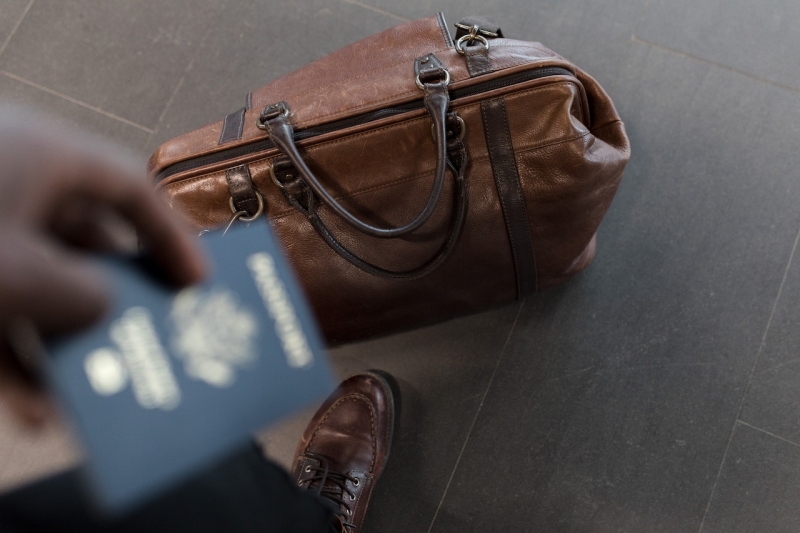
What is Business Travel?
Millions of professionals worldwide engage in business travel each year. Business travel is when you hit the road or take to the skies for work-related purposes. So, if you've ever traveled across state lines for a meeting or hopped on a plane for a conference, you've been on a business trip.
According to the Bureau of Transportation Statistics , Americans take over 400 million long-distance business trips yearly, accounting for roughly 16% of all long-distance travel.
What is the Importance of Business Travel?
It's clear that business travel is a significant part of many companies' operations, but what motivates them to send their employees on these journeys? There are several reasons why companies invest in business travel. Here are some of them:
1. Closing Deals
Business deals often involve significant negotiation, and in-person meetings can be critical to reaching an agreement. When people meet in person, they can build trust and establish personal connections that are difficult to achieve through virtual communication. As such, closing deals in person is a common reason for business travel.
2. Exploring New Markets
Companies looking to expand into new markets often send representatives to explore the conditions on the ground and conduct research. Visiting a new market can provide valuable insights into consumer behavior, local regulations, and cultural norms that can help companies tailor their products and services to a new audience.
3. Building Relationships
One of the primary advantages of business travel is its opportunity to build stronger relationships with clients, partners, and colleagues. While email, phone, and video conferencing are convenient, nothing beats face-to-face interactions regarding establishing trust and rapport.
You can pick up on nonverbal cues during in-person meetings and establish a more personal connection. It can lead to a deeper understanding of the other person's needs and goals, which can ultimately help you provide better service or products. Additionally, in-person meetings can help address any concerns or issues more quickly and efficiently, preventing them from becoming more significant problems down the line.
4. Networking
Attending industry events, trade shows, and conferences can provide networking opportunities, learning about new trends, and meeting potential clients and partners.
Networking can be invaluable for building relationships, finding new clients or partners, and staying up-to-date with industry best practices. For example, attending a trade show can provide opportunities to showcase your products or services, meet potential clients, and learn about the latest market trends.
5. Competitive Advantage
Companies prioritizing business travel and investing in face-to-face meetings with clients and partners can gain a competitive advantage over those relying solely on digital communication. By meeting with clients and partners in person, companies can establish more personal connections and build trust, leading to more business opportunities and revenue.
Here's a business travel checklist to make business travel for your employees less stressful.

Different Types of Business Travel
Business travel can take many forms, depending on the purpose of the trip and the activities involved. Here are some of the most common types of business travel:
- Event and Conference Travel: Companies often send employees to corporate events and conferences where attendees can learn and network with peers, potential clients, and service providers.
- Training and Education: Companies may send employees to conferences and workshops to learn about trends and best practices in their functional areas. These events can provide valuable opportunities for professional development and networking, helping employees stay up-to-date on the latest industry developments and build relationships with others in their field.
- Internal Meetings and Visiting Offices: National and multinational companies may need to send employees and leadership to other offices to discuss specific projects and business strategies or to build a more integrated organizational culture.
- Company Retreats: Some companies hold retreats annually or multiple times yearly to help teams grow stronger and build company culture through shared activities.
- Client Meetings: Maintaining solid relationships with existing clients is crucial for many businesses. Account managers and others may regularly visit their most prominent clients to check in on them, take them out for a meal or drink, and generally show gratitude for their business. These visits can strengthen relationships and potentially lead to additional business.
- Trade Fairs: Many organizations attend trade shows and expos to display their products and services and connect with potential clients. Attending these events can effectively generate leads and build relationships with potential customers, especially in industries where face-to-face interactions are critical.
- Transfers and Offshore Work: Long-term transfers involve relocating employees to a different city or country for a certain period, usually to work on a specific project or set up a new function or business process.
- Transient Travel: Business transient travelers typically refer to individuals who frequently travel for short periods, often for a business meeting or work-related. These travelers usually stay in hotels or temporary accommodations and frequently move between locations for work or other activities.
- Bleisure Travel: This hybrid travel style combines business and leisure travel, allowing employees to extend their business trips to leave time for sightseeing and relaxation. Bleisure travel can benefit employers and employees, encouraging employees to volunteer for business trips more often and providing a relaxing break.

Top Challenges To Manage Business Travel
As many businesses need help managing company travel, several issues affect day-to-day operations. These include:
1. Managing Large Numbers of Requests
When managing large numbers of travel requests, keeping track of all the information and ensuring that requests are processed efficiently can be challenging. It can result in delays and frustration for employees waiting for travel approvals or information.
For example, imagine a small company with just one finance person responsible for managing all travel requests. They receive requests from various team members in different formats—email, Slack messages, and in-person visits. It can lead to confusion and delays in processing the requests and distract the finance person from other essential tasks.
2. Tracking Approvals
It's a massive headache if your company's travel approvals are manually emailed. Tracking travel approvals can be time-consuming and prone to errors. It can result in missed approvals, delayed travel, and frustration for employees waiting for approval.
Imagine a team member submits a travel request, and the finance person then sends an email to the manager for approval. If the manager is busy or forgets to respond, the request may be delayed or even missed altogether, causing frustration for the employee who is scheduled to travel.
3. Keeping Spending in Check
Managing travel costs can be difficult, especially when employees book trips independently or through different channels. It can result in overspending and frustration for finance teams who aim to keep costs under control.
For example, imagine a company where employees book travel through different channels. Some employees book expensive hotels and flights, while others find cheaper options on discount travel websites. It can lead to inconsistency in travel costs and make it difficult for the finance team to manage and budget travel expenses.
4. Being Flexible
Flexible travel policies can result in consistency, especially when balancing cost control with employee satisfaction. It can result in frustration for both employees and finance teams.
For example, a business with restrictive travel policies can limit employees to specific airlines, hotels, and routes. It may help control costs, restrict employee options, and make travel less enjoyable. On the other hand, if policies are flexible, employees may book expensive options outside the budget.
5. Reducing Errors
Reducing errors in travel management can be challenging, but it is essential to ensure accurate tracking of expenses and approvals. This can help prevent delays and frustration for employees and finance teams.

How Companies Can Manage Business Travel
Companies must make the process straightforward to ensure that team members comply with travel policies. If the process is simple, team members will find ways to circumvent the rules, and compliance will improve. The following are some common pitfalls to avoid:
- Too many rules: Too many, incredibly confusing or contradictory, can be overwhelming and frustrating for team members. It can lead to non-compliance or errors.
- A high number of touches: Too many touchpoints, like requiring additional emails to managers for approval, can slow down the process and make it difficult.
- Lots of manual steps: Requiring team members to file printed documents and receipts can be time-consuming and create opportunities for errors.
- Unclear processes: If team members are unsure of the steps or rules they must follow, they may become frustrated and disengage from the process.
To ensure compliance and simplify the process, use a corporate travel management system that walks employees through each step. By automating the process and making it easy and intuitive, team members are more likely to follow the rules and comply with company policies.
What is a Business Travel Solution?
A travel management system is a software platform that helps companies manage their employees' travel-related activities and expenses. These systems can be purpose-built tools from third parties or developed in-house by large companies. However, building a travel management system from scratch doesn't make sense with the availability of corporate travel management tools out of the box for a relatively low cost.
These systems aim to oversee, regulate, and coordinate a company's employees' travel activities and expenses. Previously, a company's office administrators or a dedicated travel manager would handle these tasks. However, with a travel management system, these manual tasks can be streamlined or automated, freeing up staff for more valuable work than monitoring others' travel plans.
A business travel solution typically offers features such as online booking, expense tracking, policy compliance, travel budgeting, and reporting. They make booking, managing, and tracking business travel much simpler and more efficient for companies and their employees.
As a business, it's essential to recognize the value of investing in business travel. There are numerous reasons why companies send their employees on these trips, including closing deals, exploring new markets, holding internal meetings, prospecting, educating, and visiting existing clients. These opportunities provide valuable experiences and insights to enhance your company's operations and bottom line.
However, managing business travel can present challenges, such as managing large requests, tracking approvals, and dealing with changes in travel plans. To address these challenges, it's crucial to have a straightforward and streamlined travel policy outlining the process for requesting, approving, and booking travel and any expense and reimbursement policies.
Another essential aspect of managing business travel is providing support and resources to employees while on the road. It includes ensuring they have the necessary technology and tools to stay connected and productive, providing guidance on safety and security, and offering access to travel support services in emergencies.
By recognizing the importance of business travel and implementing strategies to manage it effectively, your company can reap the benefits of enhanced collaboration, improved relationships with clients and partners, and increased opportunities for growth and success.
So let your employees stay connected, build relationships and enjoy their next business trip!

John Hunter
John is the Senior Manager of Event Cloud Content Marketing at Cvent. He has 11 years of experience writing about the meetings and events industry. John also has extensive copywriting experience across diverse industries, including broadcast television, retail advertising, associations, higher education, and corporate PR.

More Reading
Elevate your events with the westin tokyo, unveiling the future: a sneak peek into sonesta miami airport’s renovation, wynn is unlike anything else in las vegas.
Subscribe to our newsletter
- Cambridge Dictionary +Plus
Meaning of business trip in English
Your browser doesn't support HTML5 audio
Examples of business trip

Word of the Day
a territory (= a large area of a country that has some local government but less independence than a province or a state) of northern Canada, whose capital city is Iqaluit

Fakes and forgeries (Things that are not what they seem to be)

Learn more with +Plus
- Recent and Recommended {{#preferredDictionaries}} {{name}} {{/preferredDictionaries}}
- Definitions Clear explanations of natural written and spoken English English Learner’s Dictionary Essential British English Essential American English
- Grammar and thesaurus Usage explanations of natural written and spoken English Grammar Thesaurus
- Pronunciation British and American pronunciations with audio English Pronunciation
- English–Chinese (Simplified) Chinese (Simplified)–English
- English–Chinese (Traditional) Chinese (Traditional)–English
- English–Dutch Dutch–English
- English–French French–English
- English–German German–English
- English–Indonesian Indonesian–English
- English–Italian Italian–English
- English–Japanese Japanese–English
- English–Norwegian Norwegian–English
- English–Polish Polish–English
- English–Portuguese Portuguese–English
- English–Spanish Spanish–English
- English–Swedish Swedish–English
- Dictionary +Plus Word Lists
- Business Noun
- All translations
To add business trip to a word list please sign up or log in.
Add business trip to one of your lists below, or create a new one.
{{message}}
Something went wrong.
There was a problem sending your report.
- Credit cards
- View all credit cards
- Banking guide
- Loans guide
- Insurance guide
- Personal finance
- View all personal finance
- Small business
- Small business guide
- View all taxes
You’re our first priority. Every time.
We believe everyone should be able to make financial decisions with confidence. And while our site doesn’t feature every company or financial product available on the market, we’re proud that the guidance we offer, the information we provide and the tools we create are objective, independent, straightforward — and free.
So how do we make money? Our partners compensate us. This may influence which products we review and write about (and where those products appear on the site), but it in no way affects our recommendations or advice, which are grounded in thousands of hours of research. Our partners cannot pay us to guarantee favorable reviews of their products or services. Here is a list of our partners .
6 Ways to Maximize Benefits of Business Travel
June is a freelance writer and the author of “The Joy of Syntax" and “The Best Punctuation Book, Period.” A former staff writer, reporter and editor for the community news division of the Los Angeles Times, she also writes the weekly syndicated “A Word, Please” column that runs in newspapers in five states.
Mary Flory leads NerdWallet's growing team of assigning editors at large. Before joining NerdWallet's content team, she had spent more than 12 years developing content strategies, managing newsrooms and mentoring writers and editors. Her previous experience includes being an executive editor at the American Marketing Association and an editor at news and feature syndicate Content That Works.
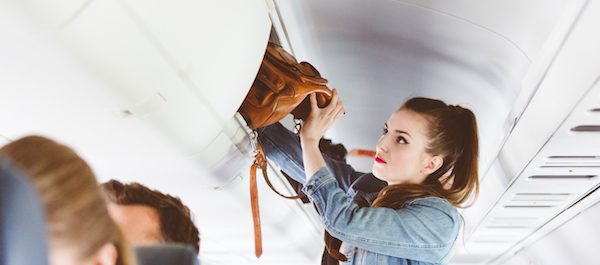
Many or all of the products featured here are from our partners who compensate us. This influences which products we write about and where and how the product appears on a page. However, this does not influence our evaluations. Our opinions are our own. Here is a list of our partners and here's how we make money .
It’s a common misperception among inexperienced business travelers: “I can’t collect points or miles earned by business travel because those miles rightfully belong to my employer, who’s paying for my ticket.”
Au contraire.
When an airline awards points or miles for a trip taken, those go to the traveler — the person who occupied the seat — regardless of who bought the ticket. Same for hotel stays.
Experienced business travelers know this already, according to a recent survey by clothier Jos. A. Bank in which 48% of respondents said earning airline miles was one of the big perks of business travel and 53% said the same about earning hotel loyalty points.
» Learn more: Shake up business travel by taking some ‘bleisure’ time
The survey also showed that business travelers spend an average of 14 hours per day working when they travel for their employer. So it makes sense to see how you can maximize the personal benefits of business travel. Here are six tips for making those business trips work harder for you.
1. Sign up for the airline’s frequent flyer program, even if you don’t expect to fly frequently
Joining one of these programs takes five minutes, costs nothing and pays you miles that could have a real cash value you don’t anticipate. For example, you might be able to transfer those miles to a hotel rewards program you like.
2. Use a rewards-earning credit card for everything on your trip
It’s a no-brainer that, if you’re spending money, you might as well get rewarded for it. Make sure the card you use pays you something you want, be it hotel points, airline miles, other loyalty points or cash back.
3. Sign up for a dining program
Many airlines offer a dining program in which you register a credit card — any card, not only the airline card. A lot of frequent flyers don’t bother with these programs because once upon a time they skimmed a list of participating restaurants and didn’t see any they liked.
But if you’re traveling, you could easily find yourself in a miles- or points-earning restaurant without realizing it. If you pay with a credit card you’ve registered with a dining program , you could get a happy surprise in the form of miles that magically appear in your frequent flyer account.
4. Consider loyalty
If your employer lets you make your own travel arrangements, look first at airlines and hotels whose loyalty programs you use . That is, if you’re collecting United MileagePlus miles for a personal trip, consider United for your business travel. Obviously, don’t waste your employer’s money by choosing a more expensive flight, but if fares are the same, there’s no reason not to choose the flight that will earn you the most rewards.
5. Charge meals and drinks to your room
Imagine you’re staying at a Sheraton, you’re a member of Marriott Rewards (remember, Marriott Rewards, Ritz-Carlton Rewards and Starwood Preferred Guest were unified under one program in August 2018) and you’re paying with your Starwood Preferred Guest® Credit Card from American Express . That cheeseburger you order at the hotel bar and charge to your room will go on your hotel bill, where it will earn you 6 points per dollar.
Whichever card you use, though, note whether it pays bonus points for travel, dining, or both, then remember that food charged to your room is usually categorized as travel whereas restaurant charges on your card are categorized as dining.
6. If you make your company’s group travel arrangements, look for programs that reward you personally
For example, Marriott’s Rewarding Events program, which is offered through 26 of its brands, seeks to attract conference planners with bonus points paid to the personal account of the person doing the planning. Whichever hotel group you’re considering, check to see what they’re doing to win your business.
How to maximize your rewards
You want a travel credit card that prioritizes what’s important to you. Here are some of the best travel credit cards of 2024 :
Flexibility, point transfers and a large bonus: Chase Sapphire Preferred® Card
No annual fee: Bank of America® Travel Rewards credit card
Flat-rate travel rewards: Capital One Venture Rewards Credit Card
Bonus travel rewards and high-end perks: Chase Sapphire Reserve®
Luxury perks: The Platinum Card® from American Express
Business travelers: Ink Business Preferred® Credit Card
Planning a trip? Check out these articles for more inspiration and advice: Travel rewards bucket list: Showering on a plane How I flew for free: Round trip NYC to India using Chase Ultimate Rewards This strategy is how I started earning major travel rewards

on Chase's website
1x-5x 5x on travel purchased through Chase Travel℠, 3x on dining, select streaming services and online groceries, 2x on all other travel purchases, 1x on all other purchases.
60,000 Earn 60,000 bonus points after you spend $4,000 on purchases in the first 3 months from account opening. That's $750 when you redeem through Chase Travel℠.

1.5%-5% Enjoy 5% cash back on travel purchased through Chase Travel℠, 3% cash back on drugstore purchases and dining at restaurants, including takeout and eligible delivery service, and unlimited 1.5% cash back on all other purchases.
Up to $300 Earn an additional 1.5% cash back on everything you buy (on up to $20,000 spent in the first year) - worth up to $300 cash back!

on Capital One's website
2x-5x Earn unlimited 2X miles on every purchase, every day. Earn 5X miles on hotels and rental cars booked through Capital One Travel, where you'll get Capital One's best prices on thousands of trip options.
75,000 Enjoy a one-time bonus of 75,000 miles once you spend $4,000 on purchases within 3 months from account opening, equal to $750 in travel.

What Are The Primary Business Travel Purposes?
Home » B2B » What Are The Primary Business Travel Purposes?
Most organizations try to find the answer to why business travel is essential, as online meetings can serve the purpose of interacting with partners, prospects, and customers. Many travel experts opine that business travel is crucial for meeting business objectives despite the extensive use of online platforms for virtual meetings during the pandemic. Virtual meetings cannot effectively accomplish the business purpose of engaging prospects in a real-life setting. Face-to-face interactions boost long-term relationships, making business travel a crucial factor for robust business growth. Among the most significant business travel purpose, sales and business development can deliver maximum ROI, followed by strategy meetings, customer service, and training and development of employees.
What is a business travel solution?
A Business Travel Solution refers to a comprehensive approach or service that addresses various aspects of corporate travel. It includes:
- Streamlining the booking process for flights, accommodations, and transportation.
- Providing tools to monitor and manage travel-related expenses.
- Ensuring adherence to company travel policies and guidelines.
- Implementing measures to address and mitigate travel-related risks.
- Focusing on tools and strategies to enhance the overall efficiency and productivity of business travel.
Purposes of business trips

A business travel purpose need not be a purely sales-oriented one. There are several objectives of business travel besides sales development. You may consider the following examples to understand the meaning of a business trip:
- Procuring raw materials or purchase
- Presentation
- Internal meetings
- Project work
- Site visits
- Survey or market research
- Training and conferences
- Event participation, such as trade exhibition
- Incentive tour
- Negotiations
- Partnerships
- Employees should clearly state the business travel purpose that directly or indirectly influences business volume and profitability. Clarity of the business travel purpose is crucial for tax auditing.
One should plan the purpose of a business trip to help derive a clear conclusion about its fulfillment. Submitting the feedback report is necessary after the completion of the business trip, mentioning the successful execution of the task.
Why is business travel still important?
A business trip can serve various purposes, but it mainly focuses on the retention and development of the organization’s internal and external customers. Several studies and surveys establish the importance of real-life meetings that are more impactful than online interactions.
A sales representative can discuss product benefits with the prospect more effectively by leveraging non-verbal cues in a face-to-face meeting. They can build a strong rapport with customers who appreciate the efforts of the sales executive to travel and meet them.
Internal meetings and training programs boost employee engagement. These are the main reasons for business travel among most corporate organizations. The following motivators help us appreciate the business travel purpose better.
1. Development and retention of internal customers
Employees are the organization’s internal customers and the tight labor market makes it difficult to replace them. The main objectives of business travel in 2022 included internal meetings, training programs, team-building events, and skills development sessions. Organizations learned the shortcomings of online training programs during the pandemic, as these sessions failed to meet the developmental objectives.
You require a real-life environment to learn certain skills and competencies. Business travel helps teams to travel and stay together, creating strong personal bonds. Employees are more creative and receptive in a real-life setup.
Remote working made employees impacted bonding between colleagues and reduced engagement. Incentive trips, group travel, and conferences can help employees re-establish a strong connection. Many companies focused on face-to-face group events to motivate employees after months of working in isolation.
2. Developing and retaining external customers
Customers are crucial for organizational growth. Organizations emphasize retaining and developing existing customers, as finding and developing new customers requires time, patience, and expenses. Business travel to develop and maintain strong customer relationships is justifiable as many organizations are leaving the virtual environment to have face-to-face interactions with their customers.
Organizing business travel to cover business destinations and meet customers in person boosts loyalty and confidence in your organization. Companies must take care of employees’ safety and well-being by implementing an online travel management solution to fulfill the duty of care in the post-pandemic era. Paxes helps organizations streamline their travel programs to simplify business travel policy compliance.
How to stay connected with the office during travel?
Staying connected with the office while traveling is crucial for efficient business operations. Key strategies include:
- Mobile Connectivity: Ensure your mobile plan supports international use for calls, texts, and data.
- Cloud-Based Tools: Utilize cloud-based collaboration tools for real-time document sharing and communication.
- VPN Access: Set up a Virtual Private Network (VPN) for secure access to office networks and files.
- Regular Check-ins: Schedule regular virtual check-ins with the team to stay updated on projects and tasks.
Adjusting to different time zones
Adjusting to different time zones is essential for maintaining productivity during business travel. Consider these strategies:
- Gradual Adjustment: Adjust your sleeping and waking times gradually before the trip to adhere to the new time zone.
- Hydration and Nutrition: Stay hydrated and opt for light, nutritious meals to support your body’s adjustment.
- Daylight Exposure: Spend time outdoors during daylight hours to help regulate your circadian rhythm.
- Strategic Napping: Take short naps strategically to combat fatigue and adapt to the local time.
Despite the easy availability of online meeting apps like Zoom or Skype, business travel continues to boost organizations’ business, fulfilling myriad business objectives. Appreciating the value of business travel purpose is crucial to explore the true benefits of business travel.
Physical or face-to-face interactions are more effective in establishing a strong relationship with customers, colleagues, and associates. Automating business travel processes using online travel management solutions like Paxes streamlines business trips. Organizations can implement policies and ensure cost savings by integrating advanced AI into the platform.
Suggested Read: All About Global Corporate Travel Management
Business Travel Purpose FAQs
Which is the top business travel purpose.
Sales and business development is the most frequent purpose of a business trip.
What are the four reasons for business travel?
Sales, internal meetings, client management, and employee training are the four reasons for business travel.
Why is business travel necessary?
Business travel allows face-to-face interaction and boosts engagement. It is more effective in establishing a sound business relationship than in virtual meetings.
What are the main benefits of business travel?
Business travel allows personal interactions, builds confidence and helps learn new ideas.
Which is the most suitable way to establish a business relationship?
Meeting the person face-to-face and discussing matters of business interest establishes a business relationship.
How can I efficiently plan a business trip?
Efficient planning of a business trip involves defining objectives, making bookings, managing expenses, crafting an itinerary, and adhering to company travel policies.
What benefits does business travel offer for networking and professional development?
Business travel provides networking opportunities, face-to-face meetings to strengthen relationships, exposure to different cultures.
What essential items should I pack for a business trip?
Pack travel documents, business attire, electronic devices, essential toiletries, and important contacts for a business trip. Be prepared with everything you need for meetings and personal comfort.
What cultural etiquettes should I be aware of during international business travel?
When traveling internationally for business, it is crucial to familiarize yourself with local greeting customs, adhere to dress codes, understand gift-giving practices, and adapt communication styles.
Explain examples of business trip purposes?
Business trips serve various purposes, such as client meetings for project discussions, attending conferences or exhibitions for networking, participating in training or workshops for skill enhancement, and conducting market research for business expansion.
Pratyush is a traveling enthusiast who always looks for innovations in business travel management. He has 5 years of experience writing content on corporate travel management and working closely with expert business travel facilitators.
Related Posts

Corporate Hotel Rewards Program: High Savings And Great Perks
Booking corporate travel is vulnerable to money drain for a huge number of organizations around the world. Inefficient bookings and last-minute changes in the itinerary is the primary reason for monetary wastage. Therefore, it becomes Read more…
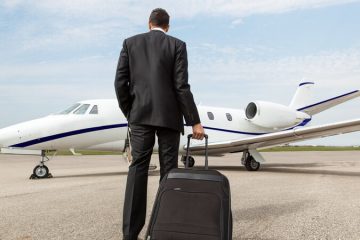
Corporate Flight Management: Effective Ways To Book Air Travel
Booking flights for corporate travel requires knowledge of inventory and an efficient network with the vendors. However, booking flights as per the requirements is work that is only half done. When planning and managing corporate Read more…

What To Look For In Business Travel Booking Sites In Kuwait?
Booking for corporate travel in Kuwait and around the world requires ultimate diligence and knowledge about the flights, hotels, transfers, and schedules. It may be extremely challenging if you are using manual processes and personal Read more…
Let's get started!

Thanks for submitting your details.
We'll get back to you shortly.
You are using an outdated browser. Please upgrade your browser or activate Google Chrome Frame to improve your experience.
105 Business Trip Vocabulary Words and Phrases
If you’re an English learner who will be taking international business trips, having the right vocabulary is crucial. Learn the words and phrases in this guide to make you feel more confident speaking English, no matter where your work takes you.
These business trip vocabulary terms can help you with getting to your destination, participating in business meetings and dining with your coworkers or clients, and more.
Useful Business Trip Vocabulary
Traveling by air , getting around in a new city , at the hotel, in business meetings, at business meals, and one more thing....
Download: This blog post is available as a convenient and portable PDF that you can take anywhere. Click here to get a copy. (Download)
These vocabulary words and phrases will likely come in handy on your next business trip.
Here are some useful terms for traveling by plane for your business trip:
When you arrive at your destination, you’ll have to find your way from the airport to the hotel or business venue (meeting place).
You’ll also have to figure out the most convenient mode of transportation : taxis, train, subway, bus, Uber, etc. Speak to locals or to your coworkers who live there and ask them for recommendations.
Here are some example questions you can use to help you get around a new city:
It’s likely your company has made a hotel reservation (booking) for you ahead of your business trip.
Here are some example phrases that might be useful when talking to the receptionist at the hotel:
- Thousands of learner friendly videos (especially beginners)
- Handpicked, organized, and annotated by FluentU's experts
- Integrated into courses for beginners

Of course, the most important part of your trip is the time when you’ll be discussing business and accomplishing your professional goals.
In order to be successful, you’ll need to know some key vocabulary for business meetings .
Lunches and dinners play an important part in making business deals, building business relationships and celebrating partnerships.
Whether you’re attending or hosting a business meal, it’s important to know how to handle the basics of dining with your business partners.
If you pack this vocabulary guide, you won’t be caught speechless when you travel for work.
Good luck with your future business trips!
- Interactive subtitles: click any word to see detailed examples and explanations
- Slow down or loop the tricky parts
- Show or hide subtitles
- Review words with our powerful learning engine

If you like learning English through movies and online media, you should also check out FluentU. FluentU lets you learn English from popular talk shows, catchy music videos and funny commercials , as you can see here:

If you want to watch it, the FluentU app has probably got it.
The FluentU app and website makes it really easy to watch English videos. There are captions that are interactive. That means you can tap on any word to see an image, definition, and useful examples.

FluentU lets you learn engaging content with world famous celebrities.
For example, when you tap on the word "searching," you see this:

FluentU lets you tap to look up any word.
Learn all the vocabulary in any video with quizzes. Swipe left or right to see more examples for the word you’re learning.

FluentU helps you learn fast with useful questions and multiple examples. Learn more.
The best part? FluentU remembers the vocabulary that you’re learning. It gives you extra practice with difficult words—and reminds you when it’s time to review what you’ve learned. You have a truly personalized experience.
Start using the FluentU website on your computer or tablet or, better yet, download the FluentU app from the iTunes or Google Play store. Click here to take advantage of our current sale! (Expires at the end of this month.)
Enter your e-mail address to get your free PDF!
We hate SPAM and promise to keep your email address safe

More From Forbes
Bleisure travel: the rise of mixing business with pleasure.
- Share to Facebook
- Share to Twitter
- Share to Linkedin
Bleisure travel is rapidly gaining in popularity.
The concept of a “‘workcation,” in which people travel to a vacation destination but work while on the trip in order to save paid time off, has been around for many years. However, “bleisure” – which merges the words leisure and business – adds extra days at the beginning or end of a business trip, thereby offering employees some additional rest and relaxation before or after diving into work.
Bleisure trips became very popular a few years ago after travel restrictions were lifted and a growing number of workers started returning to business trips. Often wanting to take their loved ones with them for a respite from the isolation everyone had been subjected to, these trips evolved into hybrids of work and pleasure.
Chrisy Ranallo, Director of Sales & Marketing at Skytop Lodge in the Pocono Mountains of northeast Pennsylvania, hosts many bleisure travelers. She explains, "Many business events have a full itinerary in a conference room setting, so they have not been able to explore the 5,500 acres and everything we have to offer. We often get requests for the group guests to extend their stays and invite their families for the weekend, since we are an easy two hour drive from Philadelphia, New York and New Jersey. Our resort offers an array of summer activities and breathtaking views for unwinding."
Research indicates that nearly half of American workers now embrace the concept of bleisure travel, and bleisure trips currently reach a worldwide market value of nearly $600 billion. Research indicates this market is expected to grow by around 500% or more over the next decade.
According to Routespring , a top-rated travel management platform that caters to the growing bleisure travel market, around 40% of business trips are extended for bleisure travel. Bleisure trips have seen significant growth in the last decade, with estimates suggesting a 20% increase from 2016. This trend has continued to accelerate, driven by factors like changing work dynamics, the desire for more personal and work balance and the relative affordability of adding personal time to business trips. Popular forms of bleisure travel include:
Best High-Yield Savings Accounts Of 2024
Best 5% interest savings accounts of 2024.
- City breaks: Extending a business trip to a major city to explore its cultural attractions, museums.
- Adventure travel: Combining a work conference in a scenic location with outdoor activities like hiking, skiing, or water sports.
- Visiting friends and family: Using a work trip to catch up with loved ones in a different city or country.
- Relaxation getaways: Adding a few days to a business trip to unwind at a resort or spa.
Top Bleisure Destinations
The following options are ideal for bleisure travel.
Skytop Lodge in the Poconos is ideal for bleisure travelers.
Skytop Lodge, Skytop, Pennsylvania
Since 1928 Skytop Lodge has stood as a symbol of elegance and refinement. Guests are transported to a more dignified time from the moment they arrive at this exquisite lodge. Steeped in 5,500 acres of nature, Skytop offers bleisure travelers an abundance of activities to enjoy before of after a few days of corporate commitment such as zip lining, treeetop adventure course and axe throwing. The array of thoughtful accommodations include: The Lodge, central location with four delectable on-site dining options and historical significance; The Inn, secluded and located near the golf course with two on-site dining options and fantastic views of the entire property; The multi-room Cottages, nestled by the lake, ideal for large gatherings.
The Lake House on Canandaigua offers a wide array of activities.
The Lake House on Canandaigua , Finger Lakes region, New York
Guests can spend several days pre- or post-work at T he Lake House and enjoy lakefront access, impeccably designed guest rooms, many featuring spacious, private balconies, plus fine dining, cocktail lounges and an artisan coffee shop. A myriad of on-site amenities await you including a full-service luxury spa complete with a picturesque sauna garden, heated lakefront pool, year-round hot tub, private daybeds and boating activities plus the sheer beauty of the Finger Lakes.
RVs are a very popular mode of bleisure travel.
THOR Industries , RV industry global family of companies
RVs have become synonymous with bleisure travel. The flexibility and freedom of RVing is an enticing option for workers, and given the increasing number of air travelers this season, it makes sense that 45 million Americans are planning to hit the road in an RV this summer. RV travel experts and brand ambassadors for THOR Industries , Gabe & Rocio Rivero advise to choose the right RV by checking out websites like Outdoorsy and Rvshare . Also, invest in reliable technology and have at least two different WiFi options. They also recommend a backup power source, including a generator or power bank.
The resort is in the Texas Hill Country.
La Cantera Resort & Spa , San Antonio, Texas
Not only does La Cantera Resort & Spa offer 115,000 square feet of business event space, but it also has a wealth of amenities for those looking to extend their stay beyond a business trip. This premier luxury resort in San Antonio offers numerous ways to unwind including an 18-hole golf course, tennis and pickle ball courts, Loma de Vida Spa and luxurious private pools. For added adventure, the resort is in the Texas Hill Country which features over 50 unique wineries.
Bleisure travelers can relax after work-related responsibilities.
Rosewood Villa Magna , Madrid, Spain
Situated on the tree-lined Paseo de la Castellana, Rosewood Villa Magna occupies a prime location along Madrid’s most coveted grand boulevard. The hotel offers both elegant indoor and beautifully presented outdoor venues. The hotel’s exquisite indoor and outdoor meeting, event and conference venues accommodate gatherings from 10 to 500 people. Perfect for bleisure travelers, the hotel offers unique experiences like access to enjoy Madrid’s best football matches along with wellness journeys where guests can venture off-property through programs that explore the city through a therapeutic lens.
The hotel immerses business travelers in a unique experience.
Grand Bohemian Charlotte , Charlotte, North Carolina
Located in the center of North Carolina’s business district in Uptown Charlotte, Grand Bohemian Charlotte , a Kessler property, welcomes guests to experience luxury bleisure just steps away from the Charlotte Convention Center. Inspired by Argentinian heritage, the Queen Terrace showcasing stunning, floral murals or the Palace Ballroom filled with four hand-crafted crystal chandeliers, immerses business travelers in a unique experience for a blend of sophistication and artistic expression. Guests can experience “A Taste of Malbec: Altitude Flight,” a self-guided, culinary pairing sampling of three Malbec wines.
Elevated amenities make it ideal for bleisure travelers.
Shashi Hotel , Mountain View, California
Shashi Hotel serves as an urban oasis designed with both corporate and leisure travelers in mind, offering an abundance of amenities for every type of guest. They recently debuted a new technology that is perfect for bleisure travelers, and specifically neurodivergent travelers, called Living Room in a Box. powered by AI, that allows guests to enjoy a fully customizable experience, creating the feeling of a guest’s own Living Room within the hotel room. The hotel's proximity to major tech hubs across Silicon Valley, combined with high-end facilities and elevated amenities make it the ideal choice for bleisure travelers.
This unique hotel caters to adventurous bleisure travelers.
Big Cypress Lodge, Memphis, Tennessee
Big Cypress Lodge is a one-of-a-kind wilderness hotel located in the iconic Bass Pro Shops at the Pyramid in downtown Memphis boasting accommodations that resemble vintage cabins, a Cypress Swamp featuring aquariums teeming with fish and alligators and two sky-high culinary outlets offering panoramic views of the Memphis skyline. Perfect for work and play, the 32-story Pyramid offers plenty of meeting space and leisure activities any bleisure traveler is sure to enjoy. Big Cypress Lodge’s meeting, group and event spaces accommodate 10 to 350 people. The Lodge offers a wide variety of attractions on and off the resort to make your off-site standout, such as underwater-themed bowling at Fishbowl, onsite shooting and archery ranges and easy access to all that Memphis has to offer including live music on Beale Street and the Memphis Zoo.
Bleisure travelers can enjoy a Tequila Bar.
Rosewood Inn of the Anasazi, Santa Fe, New Mexico
Rosewood Inn of the Anasazi offers great accommodations for business travelers who also want to incorporate leisure into their trips. The property blends Southwestern charm with modern amenities, with stylish accommodations offering comfortable work spaces and complimentary Wi-Fi. Its central location only steps away from Santa Fe’s historic Plaza provides easy access to business venues, cultural attractions and local dining options. Guests can enjoy the Anasazi Restaurant, serving contemporary American cuisine with local influences, perfect for business meals and networking. Unique experiences offered on property include the Tasting Experiences, where guests can choose to learn the history and process of either Tequila or American Whiskey.
- Editorial Standards
- Reprints & Permissions
Join The Conversation
One Community. Many Voices. Create a free account to share your thoughts.
Forbes Community Guidelines
Our community is about connecting people through open and thoughtful conversations. We want our readers to share their views and exchange ideas and facts in a safe space.
In order to do so, please follow the posting rules in our site's Terms of Service. We've summarized some of those key rules below. Simply put, keep it civil.
Your post will be rejected if we notice that it seems to contain:
- False or intentionally out-of-context or misleading information
- Insults, profanity, incoherent, obscene or inflammatory language or threats of any kind
- Attacks on the identity of other commenters or the article's author
- Content that otherwise violates our site's terms.
User accounts will be blocked if we notice or believe that users are engaged in:
- Continuous attempts to re-post comments that have been previously moderated/rejected
- Racist, sexist, homophobic or other discriminatory comments
- Attempts or tactics that put the site security at risk
- Actions that otherwise violate our site's terms.
So, how can you be a power user?
- Stay on topic and share your insights
- Feel free to be clear and thoughtful to get your point across
- ‘Like’ or ‘Dislike’ to show your point of view.
- Protect your community.
- Use the report tool to alert us when someone breaks the rules.
Thanks for reading our community guidelines. Please read the full list of posting rules found in our site's Terms of Service.
Travel Planning Center
- Ticket Changes & Refunds
- Airline Partners
- Check-in & Security
- Delta Sky Club®
- Airport Maps & Locations
- Flight Deals
- Flight Schedules
- Destinations
- Onboard Experience
- Delta Cruises
- Delta Vacations
- Delta Car Rentals
- Delta Stays
- Onboard Wi-Fi
- Delta Trip Protection
- How to Earn Miles
- Ways to Redeem Miles
- Buy or Transfer Miles
- Travel with Miles
- SkyMiles Partners & Offers
- SkyMiles Award Deals
- SkyMiles Credit Cards
- SkyMiles Airline Partners
- SkyMiles Program Overview
- How to Get Medallion Status
- Benefits at Each Tier
- News & Updates
- Help Center
- Travel Planning FAQs
- Certificates & eCredits
- Accessible Travel Services
- Child & Infant Travel
- Special Circumstances
- SkyMiles Help
Whoops! Looks Like This Page Had a Gate Change
We're sorry, it seems that this page has changed to something different than you were expecting due to a possible URL change or a promotion ending. Not to worry though, we'll do our best to get you where you need to be.
To help you take off, you can choose from our most helpful pages below, use our search tool to search for a specific topic or simply start again from our home page .
Plan your next trip using our planning tools to help keep you informed and learn about our flexibility to protect your upcoming travel.
Help Center
Learn about ways to quickly manage your trip yourself, maintain your SkyMiles® account, explore policy details, and more.
Baggage & Travel Fees
Find out about all things related to baggage, travel services offered, same-day travel changes, and possible additional fees.
Destination Requirements
Explore our interactive Delta Discover Map to learn which destinations are open for travel and any potential entry requirements.
- Investor Relations
- Business Travel
- Travel Agents
- Comment/Complaint
- Browser Compatibility
- Accessibility
- Booking Information
- Customer Commitment
- Tarmac Delay Plan
- Sustainability
- Contract of Carriage
- Cookies, Privacy & Security
- Human Trafficking Statement (PDF)
I've traveled to 20 countries in 2 years. I found the most stunning coast in one of the least-visited countries.
- I traveled to Timor-Leste in May and spent four days exploring its capital city.
- Timor-Leste is one of the least-visited countries in the world.
- While inaccessible and expensive, it was worth visiting for its unspoiled coastline.

I've spent the past two years traveling to 20 countries . While most of these countries — from the Maldives to France — were among the world's most popular, it was the off-the-beaten-path destinations that I enjoyed most.
Last month, I traveled to Timor-Leste , a country located in the South Pacific. The country comprises the eastern part of Timor Island and two smaller islands. At 5,800 square miles, it's comparable in size to the Bahamas.
It's also the 14th least-visited country in the world and the least-visited in Asia, according to a January report from CEOWorld magazine . Some 81,000 tourists visited Timor-Leste in 2023 — putting it just ahead of Chad and Sierra Leone, per the report.
The lack of tourists is not a direct result of the pandemic either. Back in 2019, only around 80,000 tourists had visited, per the National Statistics Directorate Timor . While researching my trip, I struggled to find information online for tourists — save for a handful of short vlogs on YouTube. I ended up having to learn along the way.
Here are seven things that surprised me about Timor-Leste.
1. It's difficult to fly there — and even harder to get around.
Only a handful of airlines fly to Dili, the capital, where the only international airport in Timor-Leste is located. Tourists can only fly to Dili from Bali , Indonesia, and Darwin, Australia. I was in Bali for three weeks, so I decided to fly with the Indonesian budget airline Citilink. Dili's airport is tiny — there's only one departure gate and one runway.
There are no ride-hailing services in Timor-Leste. While there are some taxis to help tourists get around, I only spotted them around the airport and in the city center. I ended up meeting Fernando, a local, who took me around the city on a scooter. I found that traveling via scooter was the best way to sightsee from the coasts to the surrounding mountains.
2. There aren't many options when it comes to accommodation.
While Hilton plans to open a hotel in Dili's business district later this year, when I visited, there were no luxury resorts or international hotel chains in Timor-Leste. With only around 70 hotels and guesthouses in the country listed on Google Hotels, lodging choices online were limited. I booked three nights at Timor Plaza Hotel & Apartments, a three-star hotel located next to a small mall in the city center.
After chatting with other travelers, I found many were staying in local guesthouses by the beach. They're usually a simple set-up, comprising a small room with a bed, mosquito net, and a fan. You can spot signs at the side of the road showing if there are rooms available for the night. Since there are very few tourists in the country, chances are you can negotiate a rate and book your stay on the spot.
3. Locals use US dollars — which means it's more expensive than other nearby countries.
The US dollar is the official currency. While used interchangeably, The East Timor Centavo is only minted in coins and pegged to the US dollar at $1 to 100 centavos. This makes Timor-Leste more expensive than many other countries in Asia.
Related stories
In Bali, a plate of nasi goreng — an Indonesian fried rice with satay — costs an average of between $3 to $4.50. In Dili, I paid between $10 and $15 for a similar dish. In Bali, renting a scooter for a day can cost as little as $3. In Dili, it costs over five times more, between $25 and $35.
4. Not everyone speaks the same language.
While Portuguese and Tetum are the official languages of Timor-Leste, English and Indonesian are the working languages. However, only 13.5% of locals speak Portuguese, according to the US Department of State .
The majority of locals I met in Dili spoke Tetum and Indonesian. Due to the high number of ethnic groups in Timor-Leste, there are at least 16 additional languages between them.
As I grew up in Singapore and can speak some Indonesian , when locals didn't speak English, that was my fallback language. Although Fernando, my guide, told me tourists needed to be careful when conversing in Indonesian. He noted that some locals may get offended, considering the complicated history between these countries. I found that it was best to ask what language they prefer to speak when in doubt.
5. Very few American chains operate in the country.
Only a handful of American food chains exist in Timor-Leste, mostly in Dili's city center. I spotted a Burger King and a Gloria Jean's Coffee outlet next to each other right outside the hotel where I was staying — McDonald's doesn't operate in Timor-Leste. As an adventurous eater, I had all my meals at locally-run eateries and cafés, where I had Indonesian and Timorese fare.
A few stores sell American brands like Head and Shoulders and Maybelline when it comes to toiletries and makeup. But no-name brands are more common and are sold for much cheaper.
6. The landscapes are some of the most pristine in the region.
I found that Timor-Leste offered some of the most scenic views in Asia.
I spent most of my time at Cristo Rei Beach — which is overlooked by an 88-foot-long statue of Jesus Christ — at the northern tip of Dili. It's a natural white-sand beach with the clearest waters I have ever seen — even clearer than the Maldives . I could see the outline of the mountainous Atauro Island from the coast, famed for its rich, colorful reefs.
After traveling the region extensively, I found Dili the most scenic capital city I've seen. Its gorgeous coastline is flanked by towering mountains.
7. You won't find the local nightlife listed online — but you'll find it in the streets.
On Google Maps, there are only a few local nightlife establishments listed — and most have no photos, reviews, or information. But my guide, Fernando, shared that locals love drinking the local palm wine and dancing to Kizomba, a dance genre originating from Angola, in the late evenings.
I was fortunate to be in Timor-Leste on May 20, during National Day. It marks when the country gained independence from Indonesia . I found thousands of people partying by the beach and hundreds of motorcycles revving down the coast to celebrate the day. The energy was unexpected — and a memorable surprise that I'll never forget.
- Main content
- Share full article
Advertisement
Supported by
My First Trip to Norway, With A.I. as a Guide
Can artificial intelligence devise a bucket-list vacation that checks all the boxes: culture, nature, hotels and transportation? Our reporter put three virtual assistants to the test.

By Ceylan Yeğinsu
The assignment was clear: Test how well artificial intelligence could plan a trip to Norway, a place I’d never been. So I did none of my usual obsessive online research and instead asked three A.I. planners to create a four-day itinerary. None of them, alas, mentioned the saunas or the salmon.
Two assistants were, however, eager to learn more about me in order to tailor their initially generic recommendations, which they had spewed out within seconds. Vacay , a personalized travel planning tool, presented me with a list of questions, while Mindtrip , a new A.I. travel assistant, invited me to take a quiz. (ChatGPT, the third assistant, asked nothing.)
Vacay’s and Mindtrip’s questions were similar: Are you traveling solo? What’s your budget? Do you prefer hotels or Airbnbs? Would you rather explore the great outdoors or pursue a cultural experience?
Eventually, my chat sessions yielded what seemed like well-rounded itineraries, starting with one day in Oslo and moving on to the fjord region. Eventually, I locked down a trip that would combine the assistants’ information and go beyond a predictable list of sites.
This time around, my virtual planners were far more sophisticated than the simple ChatGPT interface I used last year on a trip to Milan. Though it offered more detailed suggestions for Norway, I ended up ditching ChatGPT in the travel-planning stage after it repeatedly crashed.
Vacay’s premium service, which starts at $9.99 per month, included in-depth suggestions and booking links, while Mindtrip, which is currently free, provided photos, Google reviews and maps. During the trip itself, each delivered instantaneous information by text and always asked if more specific details were needed. Sadly, only ChatGPT offered a phone app, whose information I found to be outdated (the $20-per-month premium version is more current).
I’m not alone when it comes to turning to A.I. for help: Around 70 percent of Americans are either using or planning to use A.I. for travel planning, according to a recent survey conducted by the Harris Poll on behalf of the personal finance app Moneylion, while 71 percent said using A.I. would most likely be easier than planning trips on one’s own.
I decided to find out for myself in Norway.
A whirlwind day in Oslo
After I landed at Oslo Airport, all three assistants directed me to the Flytoget Airport Express Train , which got me to town in 20 minutes. I was delighted to find my hotel adjacent to the central railway station.
Choosing accommodations had not been easy. I was looking for a midrange boutique hotel, and the A.I. assistants generated many options with little overlap. I went with Hotel Amerikalinjen , Vacay’s recommendation, which it described as “a vibrant and unique boutique hotel in the heart of Oslo.” Its location was the main draw, but overall the hotel exceeded my expectations, blending comfort and style with the 20th-century charm of its building, which once housed the headquarters of the Norwegian America Line shipping company.
For the one-day Oslo itinerary, the assistants were in agreement, packing in the city’s top sights, including the Vigeland Sculpture Park, the Royal Palace , the Nobel Peace Center, Akershus Fortress and the Munch Museum. I shared my location and asked each assistant to restructure the itineraries to start from my hotel. But when I gave in to my own research instincts and pulled up Google Maps, I saw that the order they suggested didn’t make sense, so I plotted my own path.
By the time I got to Frogner Park at midday, I had already covered half of the sights, and after walking past more than 200 sculptures by the Norwegian sculptor Gustav Vigeland, I was happy to sit down and admire his granite monolith of entwined humans.
For lunch, the assistants recommended high-end restaurants in the bustling waterfront neighborhood of Aker Brygge . But I wanted a quick bite in a more relaxed atmosphere, so I ditched A.I. and walked to the end of the promenade, where I stumbled upon the Salmon , a cozy establishment where I started with salmon sashimi that melted in my mouth and finished with a perfectly grilled fillet. How had my assistants not mentioned this place?
Next on my list was the Nobel Peace Center, the Opera House and the Munch Museum. The assistants had not recommended prebooking tickets, but fortunately, I had done so, learning, in the process, that the Peace Center was closed, a crucial bit of information that A.I. did not relay.
It was chilly for mid-June, and as I walked along the harbor promenade toward the Munch Museum, I spotted small floating saunas, which my assistants had not included. I went back to the ChatGPT phone app for recommendations. Even though I was eager to try a floating sauna, where people warmed themselves and then plunged straight into the frigid waters of the Oslofjord, I took ChatGPT’s suggestion and booked the Salt sauna, which is where I headed after spending a few hours at the Munch Museum, with its extensive works by the Norwegian artist and its sweeping views of Oslo’s harbor.
At the Salt cultural complex , a large pyramidal structure on the water, I was relieved that swimsuits were a requirement. In Scandinavia, saunas are usually taken naked , and earlier, I had asked ChatGPT for the etiquette at Salt, but it failed to give me a definitive answer. After sweating it out with around 30 strangers in Salt’s main sauna, I dipped into a cold-water barrel tub and then tried the smaller sauna options, which were hotter and quieter. It was the perfect ending to a long day.
Waterfalls, lush valleys, raging waters

Each of my assistants had different ideas on how to reach the fjord region. ChatGPT suggested taking a seven-hour train ride and then immediately embarking on a two-hour fjord cruise, which sounded exhausting. Mindtrip suggested taking a short flight to Bergen, known as the “gateway to the fjords,” and setting out on a cruise the next day, which was perhaps more efficient, but would also mean missing one of the most scenic train rides in the world. Vacay also recommended a train ride.
After conversing with the assistants, I decided on a shorter train journey (six hours) that would deliver me to Naeroyfjord , a UNESCO World Heritage site with lush valleys and thundering waterfalls. But to figure out the logistics for transport and accommodation, I needed live train timetables, which I found on my own, and information on hotel availability that none of the assistants had.
At this point, I was desperate for human guidance to navigate the region’s expensive and limited accommodations. This is where the pictures and reviews on Mindtrip were useful, helping me to understand that I would be paying premium prices for the spectacular setting of a mediocre hotel.
The train ride from Oslo to Myrdal was breathtaking: rolling hills, mountain villages, fjords, waterfalls. But nothing prepared me for the majestic one-hour Flam railway ride that followed. Vacay had described it as an “engineering marvel” with a breathtakingly steep descent as it passes picturesque villages, dramatic mountains, raging rivers and pounding waterfalls, complete with a dance performance featuring a mythological spirit known as a huldra.
The next morning I boarded a Naeroyfjord cruise, recommended by Vacay, on an electric, 400-person vessel. I was surprised by the serenity of the fjord. Later I learned from a tour guide that I had been lucky to visit when there were no large cruise ships. It was hard to imagine an ocean liner maneuvering through the narrow, windy fjord, but when I asked ChatGPT, it told me 150 to 220 cruise ships squeezed through the fjord each year, a detail that I felt the travel assistants should warn travelers about.
The cruise ended in the village of Gudvangen, where rain made me cancel a hike to a waterfall and instead try my hand at ax-throwing in the Viking Village Njardarheim. The assistants had told me that there were buses that left town every four hours, a time frame that had worked with my original hiking plan, but now I was stuck. Thankfully, I took note of the A.I. disclaimers to check all information and found an alternative shuttle bus.
On my way to Bergen, I decided to stop in the town of Voss, famous for extreme sports like skydiving and spectacular nature. All the A.I.-suggested hotels were booked, but a Google search led me to the lakeside Elva hotel , which had delicious farm-to-table food. I suspect it didn’t make the A.I. shortlist because it was new.
I ended my trip in Bergen, which, despite being Norway’s second-largest city, maintains a small-town charm with its colorful wooden houses and cobblestone streets. With only half a day to explore, I followed Mindtrip’s short itinerary, starting with a hearty lunch of fish and chips at the bustling waterfront fish market and ending with a funicular ride up Mount Floyen for panoramic views of the city and fjords. The A.I. dinner suggestion at the Colonialen was perfect: cozy vibe, live jazz and locally sourced dishes.
The bottom line
None of the A.I. programs were perfect, but they did complement one another, allowing me to streamline my travel decisions.
Overall, Mindtrip — with its polished, dynamic interface that allowed me to cross-check details with maps, links and reviews — was my favorite. While it gave some good recommendations, Mindtrip needed more prompting than Vacay, which offered a wider variety of suggestions in more detail. Unfortunately, Vacay doesn’t save chat history, which I discovered halfway into my planning after closing the website’s tab on my browser.
The biggest drawback was the absence of phone apps for Mindtrip and Vacay, which led me to rely on ChatGPT’s basic A.I. assistant when I needed on-the-spot guidance. Mindtrip, I’ve since learned, is planning to debut an app in September.
Still, there were times when I desperately craved the human touch. Before setting out on a trip, I always contact friends and colleagues for recommendations. This time, as part of the A.I. experiment, I refrained from reaching out to a Norwegian friend until after my trip, only to find out that we had both been in Oslo at the same time.
That’s one element of travel that I doubt A.I. will ever master: serendipity.
Follow New York Times Travel on Instagram and sign up for our weekly Travel Dispatch newsletter to get expert tips on traveling smarter and inspiration for your next vacation. Dreaming up a future getaway or just armchair traveling? Check out our 52 Places to Go in 2024 .
Ceylan Yeginsu is a travel reporter for The Times who frequently writes about the cruise industry and Europe, where she is based. More about Ceylan Yeğinsu
Come Sail Away
Love them or hate them, cruises can provide a unique perspective on travel..
Cruise Ship Surprises: Here are five unexpected features on ships , some of which you hopefully won’t discover on your own.
Icon of the Seas: Our reporter joined thousands of passengers on the inaugural sailing of Royal Caribbean’s Icon of the Seas . The most surprising thing she found? Some actual peace and quiet .
Th ree-Year Cruise, Unraveled: The Life at Sea cruise was supposed to be the ultimate bucket-list experience : 382 port calls over 1,095 days. Here’s why those who signed up are seeking fraud charges instead.
TikTok’s Favorite New ‘Reality Show’: People on social media have turned the unwitting passengers of a nine-month world cruise into “cast members” overnight.
Dipping Their Toes: Younger generations of travelers are venturing onto ships for the first time . Many are saving money.
Cult Cruisers: These devoted cruise fanatics, most of them retirees, have one main goal: to almost never touch dry land .

IMAGES
COMMENTS
My english teacher told me that the main difference between business trip and business travel is the following: BUSINESS TRAVEL: the kind of activity a company deals with. BUSINESS TRIP: the action or activity you do as a person. In general, business trip is more common but business travel also exists. Note that you are resurrecting an 18-month ...
3. Keep your essentials packed and ready to go in your suitcase. Keep your essential items, such as toiletries and medicines, always at hand and ready to pack. If you travel often, it's a great idea to keep these items in a case which you only use for your trips. 4. Keep your essentials handy when on the road.
Business travel. Business travel refers to traveling on behalf of your employer generally. Although it is a singular term, i.e., business travel and not business travels, it refers to all trips for work purposes. It is a general term. I might say, for example: "Business travel is becoming a significant part of our airline's income.".
Cancelled flights. Missed connections. Lost luggage. Frequent business travelers know that delays and other travel hiccups are inevitable — but while you can't avoid all disruptions, there are steps you can take to minimize your risk of encountering unexpected hassles on your next trip.. Just a little bit of extra upfront prepwork can help every mile of your travel go smoother.
A step-by-step business trip guide. Research from Statista shows that business travel contributes almost $1.3 trillion to the global economy in a single year, making it one of the world's largest economic industries. Further research highlights only upward trends in the amount that is spent on business travel as well.
But making solid travel arrangements takes time, and planning a successful business trip is about much more than just booking a flight and hotel room: it requires lots of careful groundwork to organize a detailed itinerary for a productive trip. What are the biggest concerns of business travel? Flight delays and cancellations. Missed connections.
6. Bleisure Travel. Bleisure travel, a growing trend, is time added to a business trip for leisure. It's the perfect opportunity for business travelers to stick around in a new location and explore what it has to offer without all of the travel costs of a vacation. Business leaders may wonder why bleisure travel is included on a list of types ...
The term business travel refers to traveling for work purposes. We call each journey a business trip. If you drive across town to visit a client, that is not business travel. Business travel is longer. Image created by Market Business News. If I say: "John is on a business trip," we imagine he will be away for more than one day. Wikipedia ...
10. Check-in for your flight online. Checking in and getting your boarding pass tends to be one of the more time-consuming parts of travel, but luckily, airlines have come up with ways to make it easier. For example, you can now check-in online for flights and add your boarding pass to your phone.
What is business travel? Business travel represents a trip that you take for work-related reasons. It does not include trips taken for personal reasons, such as holidays or vacations. You may make these trips alone or with other colleagues. Some examples of reasons for business travel include: Events such as conferences, lectures or exhibitions
10. Enjoy your time at the airport. If you can, opt to spend your hours before departure in the airport lounge. There, you can enjoy free food and drinks, do some work if you need to, or simply relax before your flight. 11. Use travel apps. Travel apps can help you make business trips easier than ever before.
10 tips for a domestic business trip. Here are 10 tips that can help make your next domestic trip a success: 1. Pack the essentials. Be sure to bring enough clothes to cover your entire trip and to pack items that are both comfortable and appropriate for the event (s) you're attending. Bring clothes/outfits that match the dress code or company ...
Follow these 6 steps for an effective business trip: Make your travel arrangements well in advance. Select your accommodation based on both price and convenience. Create an itinerary. Research your destination. Remember your electronics, accessories and travel documents. Prepare for your meeting. In today's digital world, we can communicate ...
A business trip is an organized journey to a specific location for the purpose of conducting business, while business travel is the act of traveling for work purposes. Business Trip. A business trip is typically planned in advance and involves going to a destination for a specific purpose.
Doing business over Zoom or Teams is all well and good, but it's widely agreed that nothing seals the deal faster or helps build fruitful business relationships than making personal connections in person.. With corporate travel at home and overseas on the rebound - experts predict it may even reach pre-pandemic levels later this year - it's a perfect time to brush up on your work trip ...
15. Workout gear. Even on a business trip, it's important to focus on your well-being. Pack some workout clothes and shoes so you can continue your exercise routine in a hotel gym or by going for a run close by where you are staying during your business trip. 16. Pajamas.
From keeping your flights and accommodation on budget to staying safe in a different city, there are many elements business travelers and management need to coordinate both before and after departure. In this beginners guide to business travel, we share everything you need to do before, during, and after your next business trip, plus a list for ...
Business travel can take many forms, depending on the purpose of the trip and the activities involved. Here are some of the most common types of business travel: Event and Conference Travel: Companies often send employees to corporate events and conferences where attendees can learn and network with peers, potential clients, and service providers.
BUSINESS TRIP meaning: a journey taken for business purposes: . Learn more.
Here are six tips for making those business trips work harder for you. 1. Sign up for the airline's frequent flyer program, even if you don't expect to fly frequently. Joining one of these ...
A business travel purpose need not be a purely sales-oriented one. There are several objectives of business travel besides sales development. You may consider the following examples to understand the meaning of a business trip: Procuring raw materials or purchase; Presentation; Internal meetings; Project work; Site visits; Survey or market research
Business class seats (pictured aboard an Emirates aircraft) in aircraft usually provide more space and facilities than the standard class.. Business travel is travel undertaken for work or business purposes, as opposed to other types of travel, such as for leisure purposes or regularly commuting between one's home and workplace.. Relatively recently, the rise of videotelephony have cause a ...
Reviewing business trip vocabulary before traveling for work will help you feel more confident speaking English on your trip. These 105 words and phrases will help you navigate airports, new cities, business meetings and more. They'll also help you make a good impression on the new people you meet during your travels!
According to Routespring, a top-rated travel management platform that caters to the growing bleisure travel market, around 40% of business trips are extended for bleisure travel.Bleisure trips ...
The forecasted path of Hurricane Beryl may impact travel to/from/through the destination(s) listed below. Check flight status frequently for up-to-the-minute information about your flight plans, or get updates sent directly to your mobile device or by email with On-Time Flight Notification.
It's also the 14th least-visited country in the world and the least-visited in Asia, according to a January report from CEOWorld magazine.Some 81,000 tourists visited Timor-Leste in 2023 ...
Vacay, a personalized travel planning tool, presented me with a list of questions, while Mindtrip, a new A.I. travel assistant, invited me to take a quiz. (ChatGPT, the third assistant, asked ...